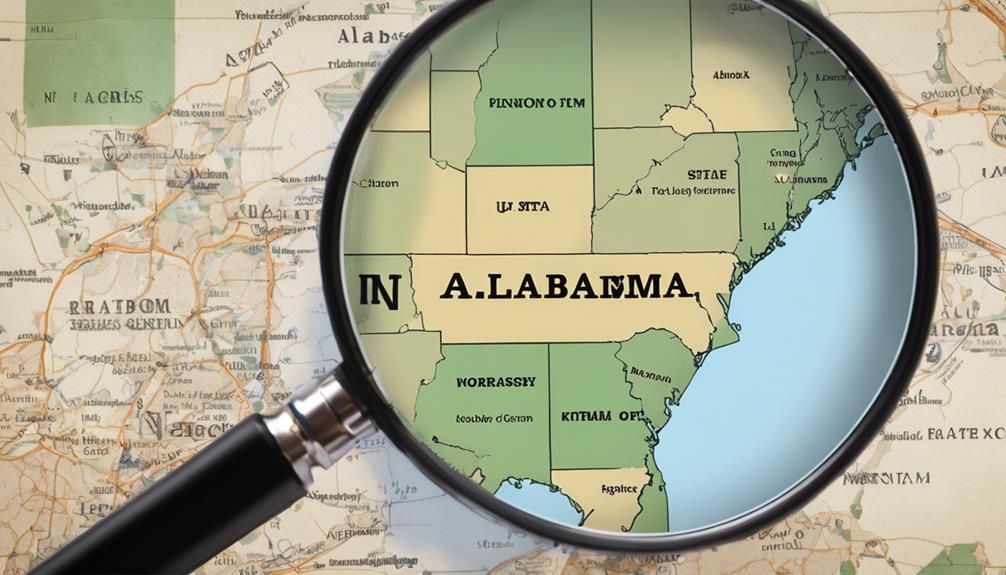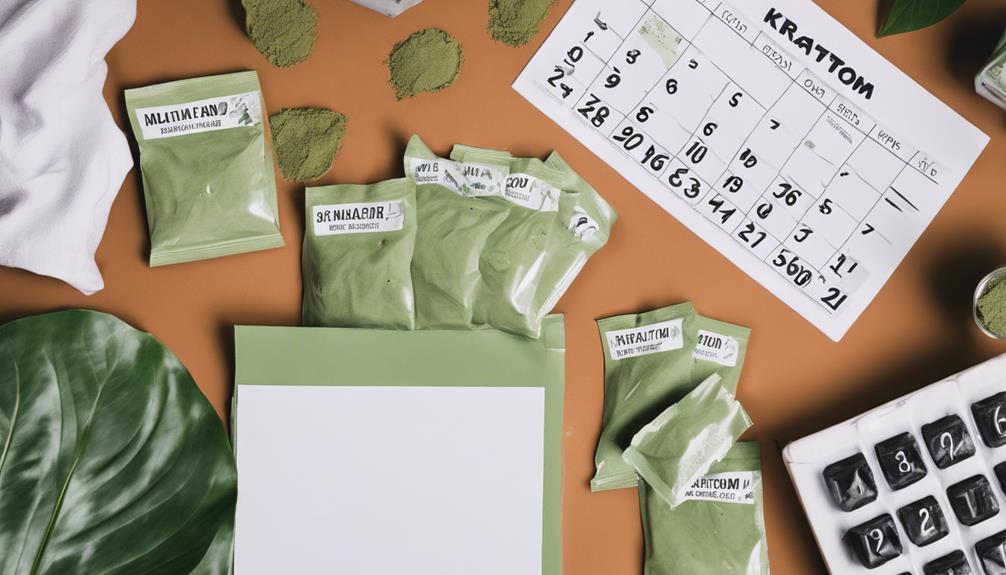Deprecated: mb_convert_encoding(): Handling HTML entities via mbstring is deprecated; use htmlspecialchars, htmlentities, or mb_encode_numericentity/mb_decode_numericentity instead in /home/users/kratomfiles/www/kratomfiles.com/wp-content/plugins/quick-adsense-reloaded/includes/template-functions.php on line 3552
Did you know that when it comes to the legality of kratom in Alabama, there's more than meets the eye? The status of this natural supplement may surprise you, as the laws surrounding its use have sparked debates and raised questions among residents. Understanding the nuances of these regulations and their implications is vital for anyone interested in this topic. So, what exactly does the ban entail, and how does it impact the broader landscape of kratom consumption in Alabama?
Key Takeaways
- Kratom is illegal in Alabama.
- Possession, sale, and purchase result in felony charges.
- Online vendors are banned from shipping to Alabama.
- Bill SB226 categorizes kratom as a Schedule I controlled substance.
- Enforcement of the ban is strict by law agencies in the state.
Kratom Legal Status in Alabama

Discussing the legality of kratom in Alabama reveals a strict regulatory framework that prohibits its possession and distribution within the state. Since May 10, 2016, when Bill SB226 was enacted, kratom has been deemed illegal in Alabama. This decision was based on the classification of kratom as a Schedule I controlled substance, making it unlawful to buy, sell, possess, or distribute kratom products containing mitragynine and 7-hydroxy mitragynine, its active compounds. Despite appeals in 2016 and 2017 to lift the ban, they were unsuccessful, solidifying the state's stance on kratom. Due to these regulations, online vendors are also prohibited from selling kratom to residents of Alabama. The stringent measures in place aim to control the use and distribution of kratom within the state, aligning with Alabama's strict policies on substances with potential risks. It is essential to adhere to these laws to avoid any legal repercussions related to kratom in Alabama.
Alabama's Ban on Kratom
So, let's talk about Alabama's ban on kratom. The ban was put into effect in 2016, making it illegal to possess or sell kratom in the state. This prohibition has had significant implications for users and vendors alike.
Kratom's Legal Status
Alabama's ban on kratom, enacted through Bill SB226 on May 10, 2016, classifies the possession, sale, and purchase of kratom as severe offenses due to its Schedule I controlled substance status in the state. Despite efforts to reverse the ban, kratom remains illegal in Alabama. The active compounds in kratom, mitragynine, and 7-hydroxy mitragynine, are specifically banned in the state. Online vendors are also prohibited from selling kratom to Alabama residents. Below is a table summarizing key points about kratom's legal status in Alabama:
| Kratom's Legal Status in Alabama | |
|---|---|
| Ban Date | May 10, 2016 |
| Controlled Substance Level | Schedule I |
| Penalties | Severe Offenses |
Reasons for the Ban
The rationale behind the ban on kratom in Alabama stems from concerns surrounding its potential for abuse and lack of regulation. Alabama classified kratom as a Schedule I controlled substance due to the presence of mitragynine and 7-hydroxy mitragynine, its active compounds. The state legislature passed Bill SB226 in May 2016, specifically prohibiting these substances. Despite attempts to reverse the ban in 2016 and 2017, the prohibition remains in place. Online vendors are also prohibited from selling kratom to Alabama residents due to the statewide ban. These measures were implemented to address worries about kratom's abuse potential and the need for tighter regulation of controlled substances within the state.
Impact on Users
Given the legal restrictions imposed on kratom in Alabama, users in the state are confronted with significant challenges and risks associated with possessing and consuming this substance. The kratom bans have made it illegal for individuals to engage in any form of kratom-related activities, leading to severe penalties such as felony charges. Alabama's classification of kratom as a Schedule I controlled substance has heightened the enforcement of the ban, resulting in arrests and confiscation of kratom products by law enforcement. Despite these strict measures, some users in Alabama continue to push for federal regulation and state decriminalization of kratom. The impact on users is profound, as they navigate the consequences of the legal status of kratom in Alabama, facing potential legal repercussions for possession or usage.
Enforcement Actions in Alabama
Law enforcement in Alabama actively cracks down on kratom violations by confiscating products and making arrests to uphold the state law banning kratom. Most counties in Alabama have implemented a grace period of 24 to 48 hours for individuals to dispose of any kratom products they possess following the ban. Deputies are diligently ensuring compliance with the new regulations at stores that previously sold kratom products. The enforcement actions taken in Alabama are primarily focused on maintaining public safety and ensuring legal compliance within the state.
Local communities within Alabama have been granted the authority to decide how they want to handle kratom-related issues based on the prevalence of kratom use in their respective areas. This decentralized approach allows for a tailored response to the specific needs and concerns of different communities. Overall, the enforcement actions in Alabama reflect a concerted effort to enforce the state's ban on kratom while considering the varied circumstances and perspectives within the state.
Impact on Kratom Users

With severe legal consequences in place, kratom users in Alabama must navigate stringent regulations and potential penalties for possession, sale, and purchase of the substance. Being aware of Alabama law regarding kratom is important for avoiding serious legal issues. Here are some key points for kratom users to keep in mind:
- Legal Ramifications: Possessing kratom in Alabama is considered a Class C felony, carrying a sentence of 1–10 years in jail and fines up to $15,000.
- Repeat Offenses: Repeat offenders may face harsher penalties, including potential sentences of 2–20 years in prison and fines up to $30,000.
- Traveling Through Alabama: Even passing through the state with kratom can lead to criminal charges, making it essential for users to avoid any association with the substance while in Alabama.
Understanding the implications of the ban on kratom in Alabama is important for users to safeguard themselves from legal consequences.
Advocacy for Kratom Freedom
Advocates within the kratom community are actively working towards securing freedom for the substance through various means. The American Kratom Association, along with thousands of advocates, is leading the charge to fight for kratom legalization across the United States. In 2016, pro-kratom petitions and press releases were key tools used to push back against the potential ban in Alabama. Supporters of kratom gathered at the State House to voice their opposition to the ban, although they faced challenges due to limited time for preparation. The American Kratom Association is at the forefront of efforts to replace outright bans with sensible regulations that can address concerns while ensuring access for responsible consumers.
| Advocacy Efforts | Description |
|---|---|
| Petitions and Press Releases | Used in 2016 against the potential ban. |
| State House Gathering | Supporters voiced opposition at the State House. |
| American Kratom Association | Leading efforts to replace bans with regulations. |
| Advocates' Determination | Thousands fighting for kratom legalization across the US. |
Concerns About Kratom Addiction

Concerns about kratom addiction arise due to the potential for physical and psychological dependence, along with the risks associated with regular usage and withdrawal symptoms. While kratom is not a federally controlled substance, its addictive properties have raised significant concerns among health professionals and regulatory bodies. Here are some key points to take into account:
- Kratom addiction can lead to physical and psychological dependence, similar to traditional opioids.
- Regular use of kratom can result in addiction, leading to withdrawal symptoms when use is discontinued abruptly.
- The lack of standardized product strengths in kratom poses health risks, as users may inadvertently consume higher doses, increasing the potential for addiction.
Being aware of these addictive properties and potential risks associated with kratom use is important in making informed decisions regarding its consumption. It is essential for individuals, especially pharmacists, to recognize the signs of addiction and withdrawal symptoms, such as sleeping difficulties, muscle spasms, and headaches, to address any issues promptly.
Bill Sponsor's Motivation
The bill sponsor's decision to ban kratom in Alabama stemmed from constituents' concerns about addiction and misuse of the substance. Constituents expressed worries about kratom addiction and abuse, which heavily influenced the bill sponsor's motivation to propose the ban. The perceived risks associated with kratom use, including its potential for addiction and misuse, were key factors driving the bill sponsor's actions. Additionally, the sponsor aimed to address the growing use of kratom and its potential impact on public health. Concerns surrounding kratom addiction and misuse prompted the bill sponsor to advocate for the ban on kratom in Alabama.
| Emotion | Reason |
|---|---|
| Concern | Addressing addiction |
| Empathy | Public health impact |
| Alarm | Risks of misuse |
| Determination | Protecting constituents |
Through the bill sponsor's actions, constituents' concerns about the negative effects of kratom on individuals and public health were acknowledged and addressed.
National Trends in Kratom Legislation

Amidst varying approaches to kratom regulation at the state level, national efforts are actively tracking proposed kratom laws across different states. The American Kratom Association advocates against criminalizing kratom and supports regulation as a means to guarantee safe consumption practices. On the other hand, the FDA and DEA have expressed concerns about the health risks associated with kratom, particularly its effects on opioid receptors. This has prompted discussions on whether kratom should be classified as a controlled substance to prevent potential misuse and abuse.
- The American Kratom Association stands for regulated access to kratom to promote responsible usage.
- The FDA highlights health risks linked to kratom consumption.
- The DEA is monitoring kratom closely due to its potential impact on opioid receptors.
These contrasting viewpoints contribute to the ongoing national dialogue surrounding kratom legislation, showcasing the complexities involved in determining the plant's legal status across the United States.
Penalties for Kratom Possession
In Alabama, possession of kratom is considered a Class C felony, leading to potential jail time ranging from 1 to 10 years. The penalties for kratom possession in Alabama are severe, with repeat offenders facing even harsher consequences of 2 to 20 years in prison and fines of up to $30,000. It is important to note that even possessing kratom for personal use in Alabama can result in significant legal repercussions. Additionally, the sale of kratom in the state carries substantial penalties due to its classification as a Schedule I substance. Moreover, individuals should be cautious as criminal charges can be enforced for simply passing through Alabama with kratom in their possession. Hence, it is important to understand the strict laws and potential penalties associated with kratom possession in Alabama to avoid any legal issues.
Future of Kratom in Alabama

As the legal landscape around kratom evolves, Alabama's future stance on kratom legality may be influenced by nationwide trends. Advocacy efforts and proposed legislation, such as the Kratom Consumer Protection Act, could shape the future of kratom regulation in the state. Stay informed on developments in other states, as they may impact Alabama's outlook on kratom legalization.
Legal Status Update
Efforts to potentially reverse the kratom ban in Alabama may continue in the coming years, with advocacy groups like the American Kratom Association pushing for regulation through the Kratom Consumer Protection Act (KCPA). While the current legality of kratom in Alabama remains unchanged, staying informed and supporting organizations like the AKA can play an important role in influencing future legalization efforts. Positive developments in other states have the potential to impact Alabama's stance on kratom legality, highlighting the significance of monitoring any changes in kratom laws within the state. Donations to organizations like AKA can aid in accelerating the process of reversing kratom bans in Alabama. Stay updated on kratom laws in Alabama to remain informed about any potential shifts in the state's stance on kratom legality.
Legislative Outlook
The legislative outlook for kratom in Alabama may shape future discussions surrounding the plant's legality in the state. Efforts to reverse the ban on kratom could gain momentum, especially with the American Kratom Association (AKA) advocating for regulation through the Kratom Consumer Protection Act (KCPA). The introduction of similar bills in other states to lift kratom bans might influence Alabama's stance on the matter. Supporting the AKA through donations could expedite the process of reversing kratom bans within the state. Encouragingly, positive developments in other states provide a glimmer of hope for potential changes in Alabama's kratom legality in the future. Stay informed about legislative updates and engage with relevant advocacy groups to stay abreast of any developments regarding kratom in Alabama.
Where to Purchase Kratom in Alabama
Despite the popularity of kratom in other parts of the U.S., purchasing this substance in Alabama is illegal due to the state's ban implemented in 2016. While it may be challenging to find kratom for personal use within the state, it is important to adhere to Alabama's laws to avoid legal consequences. Here are some points to keep in mind when looking to purchase kratom in Alabama:
- Online Restrictions: Online vendors do not ship kratom to Alabama residents to comply with the state's laws.
- Legal Ramifications: Buying kratom in Alabama can lead to severe penalties, including fines and imprisonment.
- State Variances: Legal purchase of kratom is possible in states where it is permitted, but Alabama residents should avoid acquiring it to stay within the confines of the law.
Staying Informed on Kratom Laws

To stay updated on Kratom laws in Alabama, it's important to monitor any regulatory changes that may affect the legality of Kratom products. By staying informed about the evolving laws surrounding Kratom, you can guarantee compliance with Alabama regulations. Stay connected to reliable sources like Kratom Country for the latest updates on Kratom legality in the state.
Alabama Kratom Regulations
Staying updated on Alabama's kratom regulations is crucial for understanding the current legal landscape surrounding this botanical substance. Despite being illegal in Alabama for buying, selling, and possessing, there are positive developments in other states that offer hope for the future of kratom legality in Alabama. To stay informed about kratom regulations, consider visiting Kratom Country for regular updates. By checking for changes in where kratom is legal and exploring available products, you can keep up with the evolving kratom laws and better comprehend the current landscape. Stay connected to reliable sources to remain informed about any alterations or potential shifts in Alabama's stance on kratom.
Updates on Kratom Laws
Remaining informed about the latest updates on kratom laws is essential for understanding the current legal status of kratom in Alabama. As of May 2016, kratom is illegal in Alabama, with possessing any form of the substance considered a felony. The state's strict laws impose severe penalties for selling, possessing, or buying kratom. Legislators in Alabama banned kratom in anticipation of a potential federal ban. To stay up-to-date on kratom regulations, it is advisable to regularly check sources like Kratom Country. Being knowledgeable about the legal status of kratom in Alabama can help you avoid any potential legal issues and maintain compliance with the state's laws regarding this substance.
Is Kratom Legal in All States or Is It Different for Each State?
The kratom legality in Arkansas is a bit complicated. Although it is legal in most of the state, certain counties and cities have banned its sale and possession. So, it’s important to research the specific laws in your area before using or purchasing kratom.
What is the Legal Status of Kratom in Alabama?
The kratom legality in arkansas is currently in a gray area. While it is not explicitly illegal, there is a lack of regulation and clarity surrounding its status. Individuals should be cautious and aware of the potential legal risks when using or possessing kratom in Arkansas.
Kratom's Legal Landscape in Alabama
Kratom's legal status in Alabama remains firmly regulated, with strict laws in place to prohibit its possession, sale, and purchase as of May 10, 2016. The State House passed Bill SB226, designating kratom as a Schedule I controlled substance, making it illegal throughout Alabama. Here are some key points regarding kratom's legal landscape in Alabama:
- Mitragynine and 7-hydroxy mitragynine, the active compounds in kratom, are banned in Alabama, leading to severe penalties for possession.
- Possession, sale, and purchase of kratom in Alabama incur felony charges, indicating the seriousness of the state's stance on this substance.
- Online vendors are prohibited from shipping kratom to Alabama due to the statewide ban, ensuring strict enforcement of the law.
The Etowah County Sheriff and other law enforcement agencies actively work to enforce these regulations, emphasizing the zero-tolerance policy towards kratom in the state.










